Regulating Dhaka traffic: Are ‘gate lock’ and speed caps all that it takes?

Whenever it comes to regulating Dhaka traffic, all the solutions that the authorities come up with somehow seem to miss the mark. The speed limits set last week or the "gate lock" service of buses announced this week are commendable initiatives, no doubt, but they remain rather useless when not coupled with the burning issues that need to be resolved first.
There is no debate that Dhaka's traffic management needs improvement. For years, citizens have been demanding safer roads, better public transport, and the rule of law on the streets of the world's slowest city. According to the Centre for Policy Dialogue (CPD), Dhaka commuters are stuck in traffic for 46 minutes every two hours, which leads to a waste of approximately 276 hours a year on average. A 2018 study by Bangladesh University of Engineering and Technology (Buet) found that Dhaka traffic costs the economy about Tk 37,000 crore every year, losing about 50 lakh working hours.
These gargantuan, ominous figures can be brought down drastically just with proper planning fuelled by a little goodwill and understanding from the implementing authorities such the Bangladesh Road Transport Authority (BRTA) and Dhaka Metropolitan Police (DMP). In a city like Dhaka which has a characteristically mismanaged traffic, speed limits on vehicles cannot be the only solution. They can only bring the desired effects when the other elements of the traffic ecosystem are also functioning properly.
What changes will the 40km/h speed limit on cars bring about when there are no lanes on our roads, no proper traffic signals, no bus stops, or virtually no knowledge or respect for traffic laws and rules among the general public? There is no point in blaming the drivers, or the public for that matter. Respect for the rule of law is as good as the implementation of it. What good would come out of blaming the public when they were never made aware of the rules in the first place?
During the 2018 student-led road safety movement, I remember a bus driver giving an honest interview to a TV channel that exposed the reality of our broken systems. He mentioned that he wanted to follow traffic rules, but he did not know all of them. He said he knew that he must stop when the traffic police signalled him to stop, but he also knew that if he was in a hurry, he could get away with minor violations if he stuffed a Tk 500 note in the sergeant's hand. He knew that he needed a licence to drive, but he also knew that it could be handled with the Tk 500 rule.
Oddly enough, this reflects the reality of the majority of drivers on Dhaka's roads—and not just bus drivers. At the BRTA premises, I once asked a driving licence examinee if he knew what different lane markings mean on the road. He did not. He passed with flying colours nonetheless, and got his licence the week after. He is now gleefully on the lookout for a two-wheeler in the market, ready to hit the streets in no time.
One wonders if even the BRTA officials or the traffic police themselves know all of the rules. What drives them to ignore the plights of the masses, or even their own? It is certainly not an easy job, handling Dhaka's monstrous and ugly traffic. It must take a physical and mental toll on the cops themselves.
Speed limits are great. They help save lives and make ways for inclusive urban spaces—but in cities that are already well-planned for the infrastructure. The "City 30" model, for example, is showing fantastic results in cities across Europe. In cities like Brussels, Helsinki, Zurich or Bologna, the citywide 30km/h speed limit, unless stated otherwise, are becoming popular. But in these cities, traffic is not already painfully slowed down by cars, rickshaws, buses, trucks, and pedestrians all plying on the same streets.
Educate citizens on traffic laws and regulations, make the driving licence tests stringent, implement the rule of law with hefty fines, and compensate the traffic police division with better pay and healthier work structure. Invest in redesigning the city's public transport system. A liveable Dhaka is not an unachievable dream; we just need to take the right steps.
In Zurich, vehicles don't change designated lanes frequently, or almost broken down buses don't stop wherever they can to pick up one extra passenger, slowing down lines of moving traffic behind them. In Brussels, traffic laws are implemented strictly with hefty, exorbitant fines that one cannot skip with bribes. In all of these cities where speed limits are becoming popular, citizens are not constantly afraid that these speed limits will be used against them as a trap, to extort bribes on the streets.
A citywide speed limit would have been welcomed in Dhaka had the city been more commuter-friendly. Instead, we fear that the mandatory speed cap will slow down this city further. We have not seen any transparent responses from the city authorities to reassure us either. Little will change unless the authorities decide to go all in, figure out the root causes of the issues, and take the right steps to mitigate them. "Gate-lock" buses or speed caps alone will not solve the traffic problems of this city, neither will a hundred more MRTs and expressways. MRTs and expressways are definitely a step in the right direction, but unless things change on the street level, they cannot efficiently resolve Dhaka's traffic gridlock.
According to the Copenhagen Consensus Center, Dhaka's average traffic speed is 6.4km/h, which by 2035 can dwindle to 4.7km—almost as slow as walking. The frustration of slow movement in this city often results in a mad rush whenever vehicles find an empty stretch of road. We understand that the mad rush needs to be reined in. But the frustration of slow traffic also needs to be addressed. Once we invest in the city's traffic infrastructure and get Dhaka moving, maybe then we can think about speed limits being really effective.
Dhaka has been suffering for too long for something that can be resolved just with the right approach and goodwill. It is important that the authorities implement data-driven traffic management strategies, developed with inputs from urban mobility experts and academics. Educate citizens on traffic laws and regulations, make the driving licence tests stringent, implement the rule of law with hefty fines, and compensate the traffic police division with better pay and healthier work structure. Invest in redesigning the city's public transport system. A liveable Dhaka is not an unachievable dream; we just need to take the right steps.
Zarif Faiaz is a journalist at the Tech & Startup section of The Daily Star.
Follow The Daily Star Opinion on Facebook for the latest opinions, commentaries and analyses by experts and professionals. To contribute your article or letter to The Daily Star Opinion, see our guidelines for submission.

 For all latest news, follow The Daily Star's Google News channel.
For all latest news, follow The Daily Star's Google News channel. 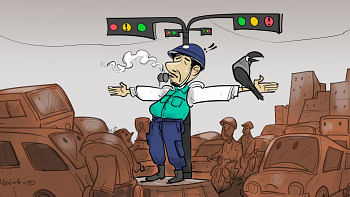
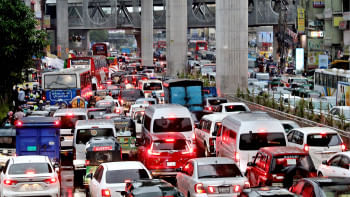



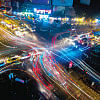
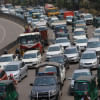
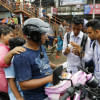
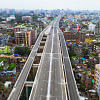


Comments